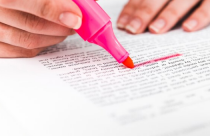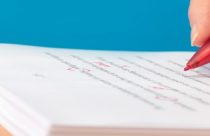An Insight into Manuscript Editing Processes: An Interview With Leonie Pipe (Part 2)

 In the second part of our interview, we continue our conversation with Leonie and discuss the various precautions that need to be taken while editing manuscripts, especially those of ESL authors, and the challenges she faces while editing manuscripts that are poorly written. Leonie also sheds some light on the differences between copy editing and substantive editing and shares some of the common mistakes made by ESL authors along with important tips to help them improve their manuscripts.
In the second part of our interview, we continue our conversation with Leonie and discuss the various precautions that need to be taken while editing manuscripts, especially those of ESL authors, and the challenges she faces while editing manuscripts that are poorly written. Leonie also sheds some light on the differences between copy editing and substantive editing and shares some of the common mistakes made by ESL authors along with important tips to help them improve their manuscripts.
What are you most careful about while editing a manuscript?
I ensure that the English is correct; that my changes have preserved the author’s intended meaning (although slip-ups can easily occur, especially if I am tired or if the author’s writing is ambiguous); that an unusual word or phrase is indeed unusual and a terminology that is not commonly used in the author’s specialist field (e.g., “NP-hard problems” or “[something] almost-surely,” which are commonly used in mathematics).
Could you give us an example of a manuscript that challenged your skills as an editor?
One of the most challenging manuscripts I have completed was a thesis, nearly 20,000 words of barely comprehensible, poorly written material, which required extensive editing to make the manuscripts of publishable quality. After working on it for two days, I had to keep taking short breaks because I simply could not focus on it. I sometimes enjoy a challenging edit, but such poorly written material (of which I’ve had a few, but never as lengthy as this) is a bit too challenging. In the sections on microscopy, I had to search for relevant information because the original was too incomprehensible. Nonetheless, I persevered and completed the editing of the manuscript. The author accepted the changes because no negative feedback was received.
How do you edit a paper that is not from your core subject area?
I enjoy editing papers outside of my “comfort zone” so to speak as such papers usually include specific terminology which I am unfamiliar with. Mostly, if these terms are consistently used, I check them online to ensure that they have been used correctly by the author. One lesson I have gained through experience is “the author is the expert, not me”. A generalist cannot, by definition, be an expert in all areas.
I also rely on my experiences for this purpose. For example, I was recently asked to edit a philosophy paper. I have never edited a philosophy paper, but I have supervised exams in philosophy (including an amanuensis), so was mindful of the way in which philosophers construct their papers, which is very different from science. I was nervous about the edit and also invited the author’s feedback, but in the end he was happy with the changes made.
How has your experience been with manuscripts written by non-native English speakers?
Almost all of my editing experience has been with non-native English speakers. The one manuscript that I edited from a native English speaker required just over half the time I spend on non-native English manuscripts. I have not noticed any standout trends between authors of different languages, but Chinese authors seem to use shorter sentences than Japanese authors. Turkish, Russian, and German authors, on the other hand, seem to use longer, more convoluted sentences than we normally use in English. I believe that many non-native English authors are trying to emulate the papers they read in English, which are not always the best examples. I myself have read many poorly written papers by native English writers and by “poorly written,” I mean lengthy, flabby prose full of redundant words.
In your experience, what mistakes do non-native English speakers usually make? Do you have any general and/or specific tips for authors?
Non-native English speakers tend to make their sentences longer than necessary. They are often scared of the active voice. For example, rather than stating “We can conclude that…” they will say “It can be concluded that…” They frequently include two or three ideas in one sentence. Sometimes they will state, e.g., “A study has found that taking Vitamin C supplements reduces the risks of colds and influenza” when “Smith et al. (2013) found that taking Vitamin C supplements reduces the risks of colds and influenza” or “Taking Vitamin C supplements reduces the risks of colds and influenza [13]”, is more appropriate. Non-native English speakers also frequently use “data” in the singular sense. They also tend to insert a degree symbol (°) by superscripting an “o” (o; always highly visible to the trained eye, but not to the amateur).
How would you define substantive editing, and differentiate it from copyediting?
Substantive editing is more intensive than copyediting. In both instances, I edit the document for clarity and brevity, and go through it with a second pass. With substantive editing, more changes are likely to be made and there may be rearrangement of text, shortening of the manuscript, and/or more extensive advice given. For example, depending on the amount of time and effort required, I might suggest that in a copyedit authors should move the text to the figure caption or remove text that is duplicated in the figure caption; however, in a substantive edit, I would make these changes for the author.
This concludes our interview series with Leonie Zandra Pipe . It was a great experience talking to her and we thank her for her time.
(This interview is a part of our interview series of connecting scholarly publishing experts and researchers.)







